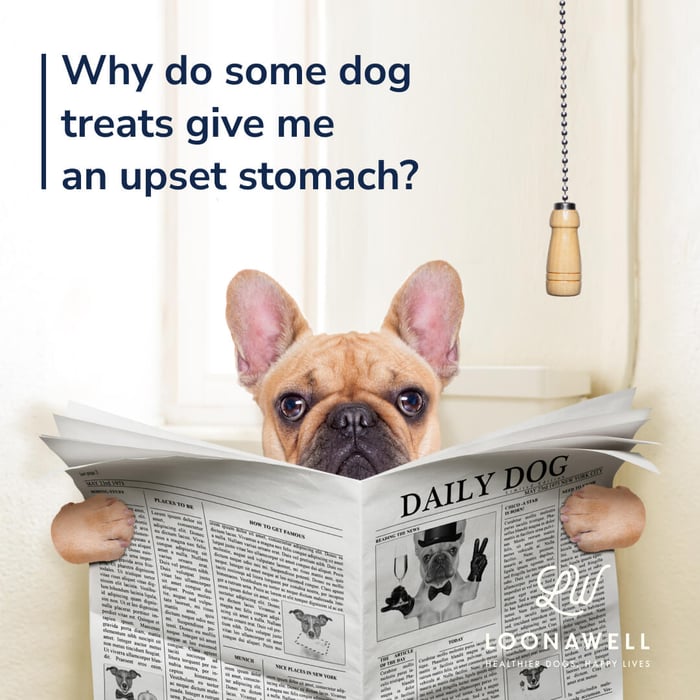We usually talk about healthy ingredients and how to share them with your pup. But today, inspired by a recent customer question, we feel it’s also important to talk about something different, something we must equally pay attention to; and it’s avoiding this ingredient in your dog's food.
Have you ever experienced reading your dog food’s label and not quite grasping all the ingredients on the list? Yep, it certainly happened to me in the past. Since I founded LOONAWELL, part of our mission has been to bring transparency and knowledge to our fellow dog owners, so we can all make informed decisions.
So, how do I know when I’m being misled by a label?
Today we’ll focus on the following ingredients: Animal by-products.
When a brand produces its packaging, it is legally required to state the ingredients contained in the product, and there are also specific rules on how to name such ingredients.
In Europe, the European Food Safety Authority (EFSA) provides scientific advice to the European Union which in turn writes the laws that govern the food and feed industries.
Do you ever wonder why in your pet food ingredient labels you sometimes read “meat meal”, “meat by-product”, “meat digest” or “meat derivative” instead of just “meat”? I did, many times, and now I know the answer: Meat meal, meat derivative, meat by-products, or meat digest, all belong to the group of so-called animal by-products. In Europe, the list of animal by-products that are allowed by law to be included in pet food include:
-Carcases and parts of slaughtered animals not intended for human consumption,
-Catering waste,
-Heads of poultry,
-Hides and skins, including trimmings, horns and feet of animals
-Pig bristles,
-Blood, placenta, wool, feathers, hair, horns, hoof cuts and raw milk from live animals,
-Aquatic animals (except sea mammals) and by-products of aquatic animals,
-Aquatic and terrestrial invertebrates.
-Foodstuff of animal origin, such as milk, eggs and meat no longer suitable for human consumption.
So now you know. When you read “meat meal” or “fish meal” or instead of “meal” you see “derivative” or “by-product”, they all belong to the above list.
You can only imagine that the nutritional value of these “meals” is significantly inferior to an actual source of protein such as a piece of meat. We spoke a bit about this in a previous article, in case you’d like to know more. So you can see how important avoiding this ingredient in your dog's food is.
Why would this be allowed in our doggie’s food?
You might be wondering, why on earth are we feeding this to our pets? Is it because these are healthy for them? No, that is not the reason.
In the EU alone, over 20 million tonnes of animal byproducts are produced every year from the industries producing food for human consumption, and they constitute a very affordable raw material that the law allows to be recycled into pet food.
If it’s not fit for humans, then why would it be fit for dogs?
I personally consider the use of the word “meal”, “derivative”, or “by-product” misleading. I believe it misleads the consumer (all of us dog owners!) into believing that we are purchasing something that actually includes meat, just as we usually consume it. When I used to read that expression I did not know it included the products mentioned above. Once I found out, I decided to make sure I was avoiding this ingredient in my dog's food and never bought pet food or treats that contained any of these again.
As many of us may know, protein is an essential component of a dog’s diet, and whether this one is of high or low quality, makes a difference. A difference in your dog’s health and processes such as building and repairing muscle and tissues, as well as providing structure for skin, hair, bones, connective tissue (ligaments, cartilage, tendons), and muscle fibers.
Today, I personally take a stance against the use of “meat meal” and its synonyms and the use of these names to describe its contents. Therefore, at my company, LOONAWELL, we don’t compromise, but instead, we have created a brand with one key core value: every ingredient used in our recipes needs to contribute positively to our dog’s health or otherwise we don’t use it. This applies to all our products.
In our Beef Delight Bio Baked Dog Treats, we use organic beef as a sole meat ingredient. We do this because we believe all our pups deserve it, they deserve food that is actually nutritious, of human-grade quality (in other words, safe for human consumption) and that has a positive effect on their health.
Now that you have the full picture you can also make an informed decision the next time you buy food or treats for your pup.




